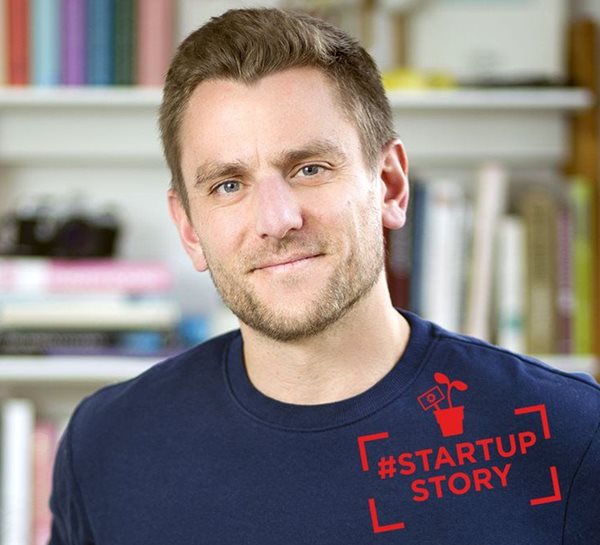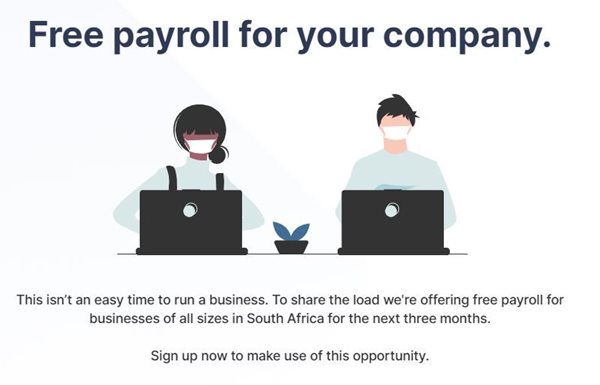“We looked at the current problem, what the available solutions are and how this can be done better. We can use tech to solve problems previously solved by manual, archaic processes,” says Bernard Bravenboer, founder and CEO of hellohr.

Bernard Bravenboer, who was also part of the founding team of SnapScan, shares more about hellohr - the tech-forward payroll and HR platform.
Hellohr is a software startup I founded to make handling payroll and HR administration easier for small businesses.
We offer an easy-to-use online system where businesses can run payroll, work out the PAYE and manage their employeesHistorically, these kinds of tools have been quite hard to use, and they’ve often been limited to the tax practitioner or linked to long-term contracts.
As a small business owner, you don’t often have that kind of capital or an in-house tax practitioner, and we wanted to make this process easier for business owners. This way they can spend their time and energy building their business, not worrying about the things that don’t earn them revenue.
For me, it’s always been this mind-boggling thing that you can work at a modern, tech company with cool tools and forward-thinking processes, but if you want to query a payslip, it takes two weeks. You get referred to someone you don’t know, who doesn’t know your history and your hands feel tied. Why is the employee experience still stuck in the 80s?
As part of the SnapScan founding team, even though we were pioneers in mobile payments and used smart tech to grow our business, at the time, I struggled to find a platform that really met our needs as we grew the team, and complied with local legislation. Years later, this is still a problem I see many small businesses and SA startups facing.
This is the problem I set out to solve. I wanted to create a better experience for managers and employees. I believe that small businesses and employees should have the same access that their South African counterparts have in big corporates. We know and have seen that tech can make this a lot easier. Even a company of two or three should be able to give their employees the same benefits and access that corporates have. I want to democratize the employee experience.
Payroll is at the core of what hellohr offers, but that is just the beginning. Or shall we say, Phase One.
The platform calculates taxes (PAYE), sends payslips to employees, keeps track of leave and allows business owners to keep track of employee information.When you hire someone, you need to have their contact details, a copy of their employment contract and their bank and tax information. We provide an easy place where you can do all of that. And, also, on a monthly basis calculate taxes that the employer would need to pay and file at SARS and send employees their payslips.
In turn, employees then have direct and easy access to their payslips and leave information. We are very excited about the future too: there are so many opportunities for us to add additional value to the business owners and employees once we have this in place: everything from better employment contract management to employee benefits.

When you want to innovate in a space, you really have to try get to the core of what “the problem” is. But typically, you only see what the current, available solutions are. Like the “fastest horses” theory, where Henry Ford posed the question of what people need and the answer was “faster horses” as opposed to a whole new mode of transport. Which is why building a new startup or business is always hard.
The way to get to understand what people need and what their problems are, is by spending time with them: understanding their day-to-day processes and needs, where the stumbling blocks are.And that’s quite hard to do remotely. Luckily, I had done most of the research pre-lockdown, because some of the best learnings come out of a face-to-face chats over a coffee.
A few weeks before lockdown hit, I’d hired my first team members – one who moved down from Joburg. Very soon after that, as the fear around Covid-19 set in, we made the move to work from home. It was hard to try establish a new team and then to suddenly be separate, to work remotely. But, it was a priority for me to make sure that we felt safe. It also meant that I looked very strictly at our cash position, ensuring that no money was wasted and that we operate as leanly as possible.
I think the hardest thing was to maintain a real sense of focus when it felt like the world around us was burning.
Some leaders may expect their employees to work like robots, but this pandemic has taken a huge mental toll on all of us.I soon set up a system where we check in with one another daily and score our mental health and happiness levels. It’s a way to check in and see how we can support each other.
We saw the effects on other countries and this is why I motivated the team to prepare to work from home two weeks before lockdown hit. This was for general safety and to help prevent further spread as well as ease fear as much as possible. We used this time to appropriately set up the WFH spaces, upgrade internet connectivity and set up a new routine.
Actually, the pandemic is creating a great opportunity for hellohr.
We’re presenting a product in a sector where people tend to be averse to change – they stick to what they know and what’s been available. The pandemic is, in some ways, giving business owners and operators a licence to relook decisions they made years ago, to look at the ‘plumbing’ of their businesses.Businesses are relooking their contracts, assessing whether they are still adding value and worth the hefty fees. There is an appetite for change and increased efficiency. Time-saving and money-saving measures have never been more important to the survival of businesses emerging out of lockdown. And we’re here to help.
As hellohr grows and we onboard more and more customers, we will need to look at growing the team – but this is a real positive for us.
We’re maintaining a WFH setup, so the team is luckily able to keep physical contact to a minimum. We’re conducting all meetings and sales calls via video call too.
On the site and app we have a built-in chat box, which is a direct line to the team.
This means that customers can ask questions at any point as they navigate the hellohr platform. We built this initially because we wanted to make the onboarding process as easy as possible for clients. And it’s worked really well during lockdown.We also set up regular video calls.
Huge growth. We’ve seen a massive amount of interest already, in such a short space of time, We’re signing up loads of companies and we will use this momentum to expand the product and team too.
There are two significant learnings that stand out for me. The first has been that in recent years the internet and available tooling options have changed a lot. It’s so much easier now to create a mock-up of a product and get real feedback than it was just a few years ago. Previously you would have to hire an expensive dev team, use expensive tech and the process would be much slower.
As en example, we’ve used tools like webflow for the website, which allows us to quickly execute on messaging or design updates. I think these new technologies will make it a lot easier for everyone to test out solutions and make it more accesible to build products.
The second major learning is that there is a real balancing act between quick execution and maintaining a long-term vision – and having a business model that supports both.
We don’t want to spend two years in a basement building tech that we’re unsure people might even want by the time it launches. We want to offer people what they need now, which means we’ve had to build quickly and execute and get real-world feedback in a short amount of time.But at the same time, it’s been so important to design a business that can be healthy and support itself in the long run. If there aren’t margins in the beginning, it’s quite hard to find them down the line.
In the startup scene, I don’t think there’s enough attention on building a business that is “real” – that has scale. And that has been a priority for me too.